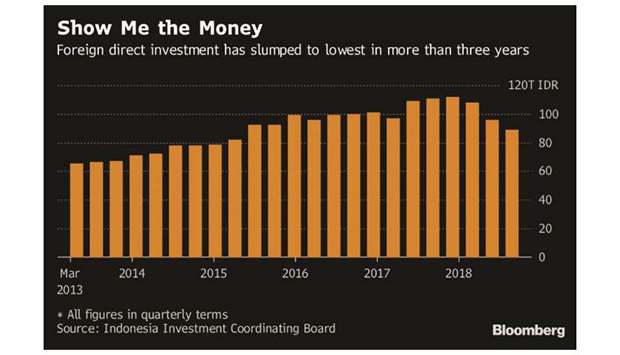Indonesia is set to wrap up a review of curbs on investment from overseas as Southeast Asia’s largest economy seeks to reverse a decline in foreign direct investment and boost exports.
The review is focused on areas that can attract more FDI and help small-to-medium enterprises diversify to boost production and exports, according to Susiwijono Moegiarso, secretary at the Co-ordinating Minister for Economic Affairs.
The revision may be finalised this week as discussions between relevant ministries have been completed, he said.
Indonesia’s economy has been struggling to fire, with policymakers focused on supporting a currency under pressure from an emerging-market rout, and outflows exacerbated by a widening current account deficit that hit a four-year high in the third quarter.
A shake-up of foreign investment and ownership rules is now on the table as President Joko Widodo, faced with an election in April, looks for a much-needed boost to growth.
The review is “to make Indonesia a good, fair place to invest,” Finance Minister Sri Mulyani Indrawati told reporters yesterday. “The Finance Ministry is ready to utilise its fiscal instruments to bring a balance between providing incentives and bringing added value for Indonesia’s economy,” she said.
The so-called negative investment list covers sectors from banking to brewing and in some cases locks out foreigners.
It has attracted the ire of foreign governments and criticism from the World Bank Group, which has said changes are needed to spur investment. The review comes amid a 20% drop in realised FDI in the third quarter from a year earlier.
The country has also slipped one place to 73 in the latest World Bank ease of doing business rankings.
“We see that we need to further optimise certain sectors to attract more investment, especially in the form of foreign direct investment,” Moegiarso said in a text message.
Widodo, known as Jokowi, is expected to moderate his economic growth target if elected for a second term, according to his own party. While he had promised growth of 7% in his first five years in office, the Indonesian economy has been growing at about 5%.

graph
